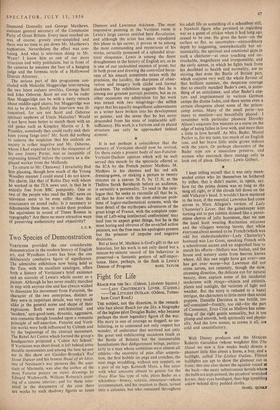Fight for Life
REACH FOR THE SKY. (Odeon, Leicester Square.) -LADY CHATTERLEY'S LOVER. (Curzon) -THE LITTLEST OUTLAW. (Odeon, Totten- ham Court Road.) THE subject, not the direction, is the remark- able fact about Reach for the Sky, a biography of the legless pilot Douglas Bader, who became perhaps the most legendary figure of the war. His story is one of courage so dogged, so un- faltering, as to command not only respect but wonder; of endurance that survived not only the great and exhilarating occasions (such as the Battle of Britain) but the innumerable humiliations that disfigurement brings, particu- larly to a man whose ambitions were almost all athletic—the enormity of pain after amputa- tion, the first hobble on pegs and crutches, the next stage straddling, without any support, on a pair of tin legs. Kenneth More, a fine actor with what amounts almost to genius for the Deep Blue Sea type of role, plays Bader as a schoolboy—breezy, volatile. immature—whom circumstances, and his reaction to them, turned into a colossus, but who remained throughout
his adult life as something of a schoolboy still, a Newbolt figure who persisted in regarding war as a game of cricket when it had long ago ceased to be one. He gives the hero—.on the' surface so flat, so uncomplex—extraordinary depth by suggesting, unemphatically but un- mistakably, the spiritual and emotional gaps jn such a character—at once touching and un- touchable, magnificent and irresponsible; and the early scenes, in which he fights back from his deathbed to health and normality, are so moving that even the Battle of Britain part, which conjures very well the whole flavour of that brilliant summer, the desperate courage that so exactly matched Bader's own, is some- thing of an anticlimax; and after Bader's cap- ture and imprisonment in various German camps the drama fades, and there seems even a certain cheapness about some of the prison- camp antics. Many of the small parts—too many to mention—are beautifully played : 1 remember with particular pleasure Dorothy Alison's exquisite few minutes as a nurse on the edge of being fallen in love with, and more than a little in love herself. As Mrs. Bader, Muriel Pavlov is, for my taste, too much of an English rose, and her brave little smile grows tedious with the years. Or perhaps characters of the Bader type are a masculine preserve, and women who encroach there manage only to look out of place. Director : Lewis Gilbert.
I kept telling myself that it was only mean- souled critics who let themselves be bothered by trifles; that it didn't matter, in opera, say, how fat the prima donna was so long as she sang all right, or if the clouds fell down on the odd Valkyrie's head. It wouldn't have mattered in the least, if the essential Lawrence had come across in Marc Allegret's version of Lady Chatterley's Lover, that the gamekeeper kept turning out to pot rabbits dressed like a panto- mime chorus of jolly huntsmen„ that we met the local hunt wearing Ruritanian tricornes and the villagers wearing berets; that while everyone about seemed to be French (which was odd but tinderstandable)—Lady Chatterley's husband was Leo Gcnn, speaking French with a schoolroom accent and an anguished face to match his efforts—Mellors was Italian, and the house and scenery came from heaven knows where. All this one might have got over—one has got over worse—but Lawrence did not come across, not remotely, though the slow, caressing direction, the delicate eye for natural beauty, does capture some of his incidental tenderness with things—objects and animals, plants and sunlight, the varieties of light and weather. But the story is reduced to a banal intrigue, the characters to little more than social puppets. Danielle Darrieux is too brittle, too self-contained—frankly, too old—for the part of Constance; Erno Crisi as Mellors has some- thing of the right gentle sensuality, but is too plump and smooth, both spiritually and physic- ally. And the love scenes, to crown it all, are cold and unsatisfactory.
Walt Disney produces and the Mexican Roberto Gavaldon (whose weightier film The Shawl we saw a few weeks back) directs a pleasant little film about a horse, a boy, and a bullfight, called The Littlest Outlaw. Filmed bullfights are apt to show the glamour out in front; this one also shows the squalor round at the back—the nasty subterranean hovels where the bulls are kept penned, the picadors' wretched horses, their eyes bandaged, their legs trembling askew behind dirty padded cloths.


































 Previous page
Previous page